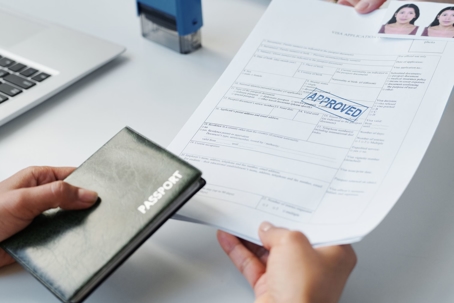Adjustment of status is one of two paths for obtaining an immigrant visa (green card) to the United States. U.S. immigration law allows an immigrant to change status to a legal permanent resident. There are many benefits to filing an adjustment of status application. Individuals can receive work and travel authorization while the application is pending. More importantly, if for some reason the application is denied. Not all immigrants living in the United States are eligible to adjust status and become a legal permanent resident.
To file an adjustment of status application, the intending immigrant must be (1) physically present in the United States, (2) have an immediately available immigrant visa, (3) be admissible to the US, and (4) have entered the country lawfully. Let’s dive deeper into each eligibility requirement.
Be physically present inside the United States;
The immigrant must be inside the United States when the adjustment of status application is filed (and will need to complete the process inside the U.S.).
Can you travel while the Adjustment of Status Application is Pending?
Some applicants may concurrently file a travel permit application concurrently with the application to adjust status. In this case, the individual can travel outside of the United States while their adjustment of status application is pending. However, USCIS will deny the adjustment of status application if the applicant travels abrod without an approved travel permit.
Have an immediately available immigrant visa
Most likely through a close family member who is a U.S. citizen or permanent resident, an employer, or being an asylee or refugee. Green card eligibility falls into three categories, with a variety of visas associated with each category. You can qualify through:
- Family: you may be eligible if you are an immediate family member, a relative of a U.S. citizen or lawful resident, or a fiancé or widow of a U.S. citizen. You may also be eligible if you have been an abused family member of a U.S. citizen.
- Employment: Certain employment-based immigration visas are eligible. If you are a first, second, or third preference immigrant employee, a physician with a National Interest Waiver, or are an immigrant investor, you are eligible for adjustment of status.
- Special Immigration: You may be eligible for a green card if you are a religious worker, special immigrant juvenile, or other qualified special immigrants
- Other: If may fall under another eligibility criteria. Your status depends on your situation in the US, your relationship with a US citizen, your home country, or your relationship with a government entity.
Be admissible to the US
There are various grounds of inadmissibility, from crime-related to health-related grounds, which are triggered by specific circumstances. Some grounds of inadmissibility have waivers,
which if granted as a matter of discretion, can allow an applicant to overcome the ground of inadmissibility. Some of the most common non-criminal grounds of inadmissibility are:
Prior deportation or removal
A prior deportation order is still valid when you attempt to enter the United States or return to it illegally. The U.S. government can simply "reinstate" the removal order, and then deport you a second time, without giving you a hearing in front of a judge.
Unlawful Presence
Unlawful presence is triggered by a departure, so as long as someone who has been living in the United States without any status has never left since their initial entry and is eligible to adjust through one of the options discussed in this advisory, they will not have to worry about unlawful presence.
Fraud and Misrepresentation
Using any fraudulent documents or misrepresenting any material fact to a government official will make someone inadmissible. INA § 212(a)(6)(C)(i) states that an individual who, “by fraud or willfully misrepresenting a material fact, seeks to procure (or has sought to procure or has procured) a visa, other documentation, or admission…or other benefit…” is inadmissible.
Alien smuggling
Assisting anyone to enter the United States unlawfully, including a relative, can make an applicant ineligible for permanent residence even if the person was not stopped by immigration authorities or arrested for doing so. INA § 212(a)(6)(E) states that any person who “at any time knowingly has encouraged, induced, assisted, abetted, or aided any other alien to enter…in violation of law is inadmissible.”
Public Charge
A public charge is anyone who would become dependent on the U.S. government after gaining immigrant status. USCIS and the DOS will consider the receipt of cash benefits for income maintenance purposes and institutionalization for long-term care at government expense in determining dependence on the government for subsistence.
Have made a lawful entry into the United States
The immigrant must have entered the United States lawfully. Lawful entry means that the individual was admitted or paroled into the U.S. For most people, this means that you entered the U.S. with valid documentation and made face-to-face contact with a U.S. immigration officer, and that officer acknowledged your entry to the United States. Some people are waved through
What If the Individual Was Waved Through?
Some individuals will be “waved through.” In Matter of Quilantan, the Board of Immigration Appeals (BIA) found that a person who is “waved through” by an immigration official meets the “inspected and admitted” requirement under INA § 245(a).11 Noncitizens who present themselves for inspection at a port of entry and are allowed to enter, even if they were not questioned by immigration agents or in possession of valid entry documents, are considered lawfully admitted so long as they did not claim to be U.S. citizen.
What If Your Visa Has Expired?
If you entered with a valid visa, but that visa has since expired, you still had a lawful entry.
If you are in the United States and believe you are eligible for a green card, but are not sure that you qualify to adjust your status, or have any complicating factors in your situation such as a criminal record, see an experienced immigration attorney. (For more information about adjustment of status visit this link)

